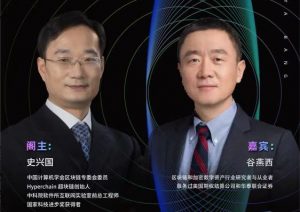
On the evening of October 24th, the twelfth episode of the fifth season of ” Observing the Langya List ” was broadcasted, and Mr. Shi Xingguo (member of the Blockchain Special Committee of the China Computer Federation, founder of Hyperchain, winner of the National Science and Technology Progress Award, and former chief engineer of the Internet Laboratory of the Software Institute of the Chinese Academy of Sciences) was the host. He was joined by Gu Yanxi (a researcher and practitioner in the blockchain and encrypted digital asset industry). The two guests provided an in-depth analysis of the storm caused by the launch of Aptos and the underlying logic of Web3 applications, as well as the competition of Hong Kong as an international virtual asset trading center.
Regarding the recent hot topic of Hong Kong’s competition to become the global development center for virtual finance, Gu Yanxi said: “After the policy was clarified, with the support of the Hong Kong government, I believe that Hong Kong will attract more talent and capital. As long as the basic elements of innovation are complete, I believe that Hong Kong will become a relatively leading global center area for the development of virtual assets finance. In the future, the Asian virtual financial market will probably form a center pattern with Singapore, Hong Kong, and Japan.”
Regarding this topic, Shi Xingguo stated: “The Web3 market in mainland China can provide more real business support for virtual asset applications in Hong Kong, and Hong Kong’s virtual asset-related policies can provide more opportunities for the combination of virtual assets and real businesses in mainland China, reaching a legal and compliant level. Moreover, Hong Kong has financial flexibility that mainland China lacks, and Hong Kong can use its own advantages while leveraging the development and application advantages of mainland China. Overall, Hong Kong is actually not inferior to Tokyo or even Singapore in this regard, so we are particularly looking forward to this policy having a real push effect and maintaining it. The opportunity in Hong Kong is a not-to-be-missed opportunity for Web3 practitioners, and everyone should pay extra attention to it.”
Regarding another recent hot topic in the crypto market, the launch storm of the new public chain “king-level” project Aptos, Gu Yanxi’s evaluation hit the nail on the head: “I never believed that Aptos was a viable project from the beginning.” “Overall, Aptos is a combination of alliance nodes and not-so-innovative innovations. Until today, we still don’t know what the outcome of the alliance chain product will be, and Aptos itself has problems in terms of functionality. As for the Move language, those of us who do development know that there is no product that can differentiate itself because of its development language. To me, this is ridiculous.” “So, the positioning of Aptos itself is problematic, and measuring the level of a public chain purely based on TPS after its launch is fundamentally unreliable.” “Personally, I think that the probability of success for any project that invests a large amount of money from the beginning is very negative.”
In the previous episodes of ” Observing the Langya List “, Mr. Shi Xingguo had pointed out some of the problems with Aptos, but at that time, rational voices were easily overwhelmed by market frenzy. Now that Aptos has encountered a launch storm, Mr. Shi Xingguo once again pointed out the problems with Aptos in easy-to-understand words, while also speaking fairly about this innovative project.
Regarding the technical shortcomings of Aptos, Shi Xingguo said: “The Move language essentially enhances the security and performance at the application layer, because it does not address the issues at the chain layer. So, it does not solve the security or performance problems at the chain layer. We can imagine that the chain layer is more like a road, and the application layer is like the cars on the road. If the road itself is not wide enough, even if you increase the load capacity of the cars, it still cannot increase the business capacity of the chain.” “The real bottleneck of blockchain is in the capacity and performance of the block itself.”
Regarding the advantages of Aptos, Shi Xingguo said: “We must admit that Aptos is trying to solve the principles of asset origination and key custody at the application layer, which is really a pain point in Web3 which is the core obstacle for many non-cryptocurrency industry users to use Web3 service. So, if they can solve this problem well, coupled with the performance of BFT consensus providing thousands of TPS, as well as the endorsement of star teams and capital, Aptos may not necessarily form a very large ecosystem like Ethereum in the future, but it still has opportunities in the capital market.”
Highlights of today’s talk:
- How can Hong Kong complement the development process of mainland China in Web3?
- How should we view the launch storm of Aptos?
- Does the Move language in the new public chain project deserve so much investment from top institutions?
- What is the essential difference between Web3 applications and Web2 applications?
- Is it wrong to turn existing Web2 products into Web3?
- How to solve the dilemma faced by creator economy in Web3?
- What problems are DAO currently facing?
For more details:
https://baijiahao.baidu.com/s?id=1747897662174944247
